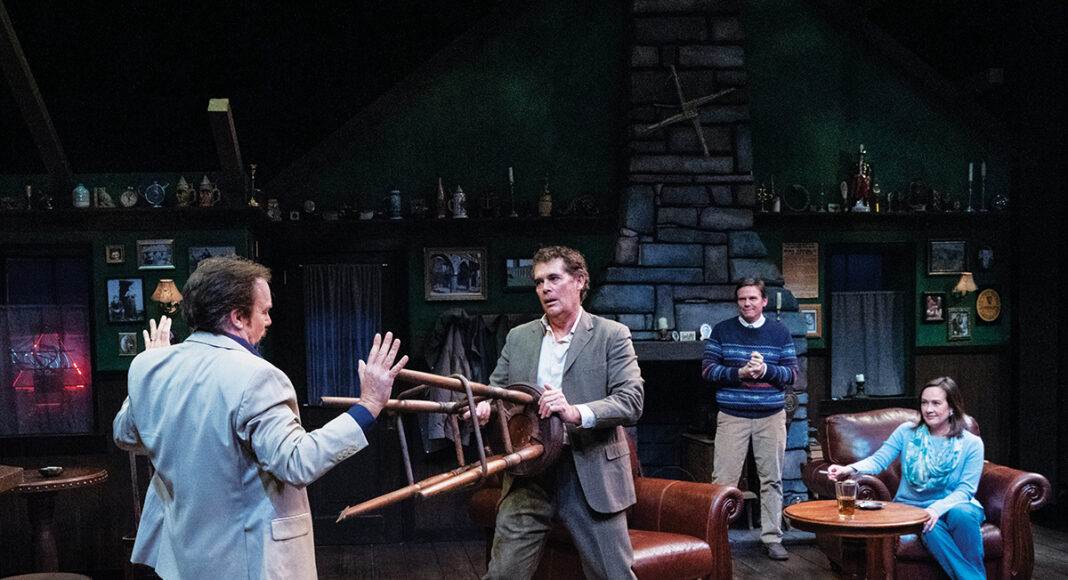The phrase “haunting drama” might have been coined for the plays of Irish bard Conor McPherson, whose acclaimed studies in brooding tall tales are fueled by ghosts, longing and plenty of Guinness. In the Jewel Theatre’s current production, The Weir, McPherson invites us to join locals in a remote Irish pub as they respond to a mysterious woman from Dublin called Valerie. As the barflies trade ghost stories with the unexpected visitor, the evening deepens with dark fears, uneasy encounters and tender revelations. The Jewel production shows why the play won the Olivier Award for Best New Play, and why McPherson is considered a jeweler of a playwright. With its small cast, simple set and scenario exploring the human desire for supernaturally inflected reminiscences, The Weir is perfect for a theatre company like Jewel. Jewel Theater Artistic Director Julie James agreed, and spoke to me about the production.
What attracted you to ‘The Weir’?
Julie James: As a producer, I love plays that are not obvious. Conor McPherson has a way of writing that cleverly presents the dichotomies of being human—the surface layer we present to those around us, and the deep, layered underbelly of feelings and thoughts and assimilation of experiences that really make us who we are. On the surface, The Weir might seem like just a lot of casual and silly talk between people in a bar, but it’s really a celebration of community, camaraderie and connection between souls—but in a kind of casual, subtle way. As an actress, tackling characters that go through life much different than ourselves is especially appealing, and in the case of The Weir, capturing not just a dialect but a sensibility and an ease with a culture that is steeped in lore and legends.
Is there a larger subtext?
What appealed to me about The Weir was that it reflects that notion that there are no little things—people are impacted by the big things that happen, of course, but the really interesting thing to see is how people are impacted by the seemingly little things. The ghost stories they tell in the play kind of have that element, and the stranger, Valerie, who comes into the room in the play creates little ripples that affect the other characters in ways that start percolating without being visible. Toward the end of the play, the room is filled with a potential “something” that wasn’t there to start.
When did you cast the play?
As it is with many of our productions, some roles were pre-cast months ahead of time, and some were cast within weeks of starting. This production has three actors we’ve worked with previously [David Ledingham, Louis Lotorto, Shaun Carroll] and two actors who are completely new to us [Wiley Naman Strasser, Katherine Stein].
How difficult is it walking the fine line between presenting a challenging property and pleasing the crowd?
I don’t find it difficult at all. We do it often. And our patrons respond. They seem to appreciate the thought-provoking, strange, challenging work just as much as they enjoy the fluffy crowd-pleasing stuff. I’m proud that we do the gamut on our stage, and our patrons have continued to support this kind of programming. We certainly don’t pretend to please all of the people all of the time, and our patrons know if our current play doesn’t happen to be their cup of tea, the next one probably will be. Regardless, they know and trust that each show we present will have quality acting and production values.
How does a well-known play remain fresh for a new audience?
Theater is a living, breathing thing, and each production and each performance has the potential to be an amazing new experience for actors with a different audience each night, even with a show you’ve done before or have been performing for years. It’s part of why actors like acting. We’ve done a Conor McPherson adaptation of an August Strindberg play [The Dance of Death], and more recently The Beauty Queen of Leenane by Martin McDonagh. McPherson and McDonagh are both Irish playwrights of a certain age, and of a certain casual boldness in their themes and writing, and that is attractive.
How is the fit between director Susan Myer Silton and McPherson’s piece?
Susan, being both a director and dramaturg, always does extensive research on whatever show she is working on. She looks for things that connect. The soul of The Weir, similar to The Beauty Queen of Leenane—which she also directed—offered layers of history and folklore and people struggling to survive and connect and triumph over the ironies of our world. That attracts me, and I knew it would attract Susan, as well.
What is it about Ireland, and Irish pubs and villages as settings that is so enduring?
I have to go back to the idea of quiet community and camaraderie, without sappiness. The Irish seem to have an attitude, a charm, that is both fun-loving and philosophical. To me that’s the best combination.
‘The Weir,’ by Conor McPherson, directed by Susan Myer Silton, is at the Jewel Theatre through Feb.20. Tickets at jeweltheatre.net.













